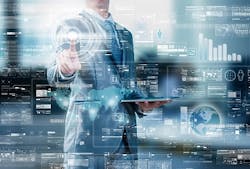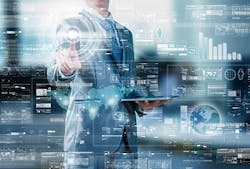Top 7 Smart Water Trends for 2017
LONDON, England - After waving goodbye to an exciting year for smart water, it’s time to roll up our sleeves and welcome in 2017.
Given concerns related to water scarcity, reliability and security, it’s now imperative to implement digital solutions to improve operations and efficiency, as well as build the right organisation and processes to support it.
For water utilities, the emergence of smart water tech providers and Internet of Things (IoT)-related devices offers ample opportunities to increase resilience and streamline operational performance.
According to Deloitte, data-driven insights “have great potential to transform the way consumers, the government and utilities think about water as a resource and how the industry plans, invests and manages water infrastructure for the future.”
While there are many exciting developments in the water sector to look out for, here are seven smart water trends to look out for in 2017 based on insider and the Smart Water Networks Forum (SWAN) expert analysis.
1. Online Customer Engagement
Today, water utilities are coming to understand and embrace the advantages of customer engagement. Through the advent of AMI solutions, utilities can now utilise direct two-way communications from customer meters to the utility, then back to customer web portals and smartphone apps. This allows utilities to deliver high quality service by alerting customers about possible leaks, blockages, pollution, etc. Customers can also proactively track their water consumption and monitor their monthly bills. In 2017, customer engagement technologies will play an even more crucial role as customers seek increased transparency and available solutions become more personalised.
2. Smart Irrigation
The global irrigation industry is undergoing a transformation with the help of technology, widely known as precision or “smart” irrigation. The irrigation industry faces significant challenges due to water scarcity, increasing crop production, and climate change. By adopting smart irrigation technologies, farmers can maximise yield rates by pinpointing where and when to irrigate through sensors or water flow controllers. This current $8.34 billion market will likely generate increased interest in the coming year.
3. Smart Wastewater Management
With increased environmental regulation, climate change, aging infrastructure, and the need to improve customer service, cities are now turning to “smart,” data-driven solutions to improve their wastewater systems. These solutions allow operators to detect infiltration and inflow, prioritise actions, quickly respond to system failures, and apply predicative modeling. In 2017, there will be a growing shift towards smart wastewater solutions, For instance, the latest SWAN research report shows how four U.S. cities are already preventing harmful sewage overflows through data technologies.
4. Real-Time Water Quality Monitoring
The ability to effectively manage problems associated with water networks, both at the source and at the distribution level, is related to detection capabilities. Contamination events such as the Flint water crisis in Michigan and the recent incident in Corpus Christi, Texas, drew global attention to water quality issues in developed countries. Utilities can proactively manage and avoid potential threats through real-time water quality monitoring. In 2017, an increased emphasis will be placed on the need for such solutions to ensure water network security.
5. Mergers and Acquisitions
2016 was highlighted by “game changing” deals, which consolidated the industry and formed strategic partnerships. Xylem acquired Sensus and Visenti. GE Water & Process Technologies signed multiple cooperation agreements with WaterSmart Software and Smart Earth Technologies. Also, Belkin, a leading consumer electronics company announced a joint venture with Uponor to “bring water up to speed with the rest of the smart home.” 2017 will likely produce similar partnerships to offer integrated solutions.
6. An Automated Future
Automated solutions for the water sector are evolving and being rapidly deployed. For instance, today, drones can collect data and inspect operations and a wastewater pumping system has integrated intelligence. The industry is changing with the development of cloud computing, big data analysis, and machine learning through remote control systems. These sophisticated systems include technology devices which can interact with one another and feed information in an optimised process. 2017 will continue to see the emergence of new automated solutions which will likely change the face of the water sector.
7. Industry Collaboration
The importance of the smart water sector will require key industry stakeholders to collaborate and leverage best industry practices. Such synergy will be needed in 2017 in order to best explore ways to address global water sector challenges. To help facilitate and expand these relationships, SWAN, the Smart Water Networks Forum, invites all smart water professionals and enthusiasts to join the upcoming 7th Annual SWAN Conference to be held May 9-10, 2017 in London.
###
Shirley Ben-Dak is the marketing manager for SWAN and head of global intiatives at SUiTS (Smarter Urban IT & Strategies).
Read more

